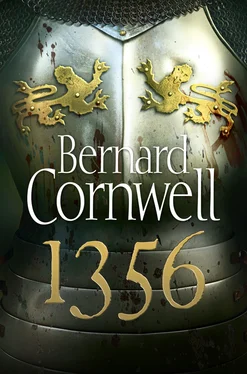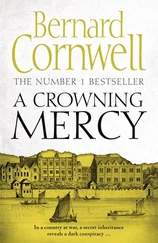He killed all three archers, then used the silk wrapping to clean la Malice ’s blade. He thought of saying a brief prayer for the men he had just killed, then decided he did not want to share heaven with such brutes. Instead he kissed la Malice , then searched the three bodies and found some coins, a lump of cheese, four bowstrings, and a knife.
The city of Carcassonne burned and filled the winter night with smoke.
And the Black Friar walked north. He was going home, home to the tower.
He carried la Malice and the fate of Christendom.
And he vanished into darkness.
The men came to the tower four days after Carcassonne had been sacked.
There were sixteen of them, all cloaked in fine, thick wool and all mounted on good horses. Fifteen of the men wore mail and had swords at their waists, while the remaining rider was a priest who carried a hooded hawk on his wrist.
The wind came harsh down the mountain pass, ruffling the hawk’s feathers, rattling the pines and whipping the smoke from the small cottages of the village that lay beneath the tower. It was cold. This part of France rarely saw snow, but the priest, glancing from beneath the black hood of his cloak, thought there might be flakes in the wind.
There were ruined walls about the tower, evidence that this had once been a stronghold, but all that was left of the old castle was the tower itself and a low thatched building where perhaps servants lived. Chickens scratched in the dust, a tethered goat stared at the horses, while a cat ignored the newcomers. What had once been a fine small fortress, guarding the road into the mountains, was now a farmstead, though the priest noticed that the tower was still in good repair, and the small village in the hollow beneath the old fortress looked prosperous enough.
A man scurried from the thatched hut and bowed low to the horsemen. He did not bow because he recognised them, but because men with swords command respect. ‘Lords?’ the man asked anxiously.
‘Shelter the horses,’ the priest demanded.
‘Walk them first,’ one of the mailed men added, ‘walk them, rub them down, don’t let them eat too much.’
‘Lord,’ the man said, bowing again.
‘This is Mouthoumet?’ the priest asked as he dismounted.
‘Yes, father.’
‘And you serve the Sire of Mouthoumet?’ the priest asked.
‘The Count of Mouthoumet, yes, lord.’
‘He lives?’
‘Praise be to God, father, he lives.’
‘Praise be to God indeed,’ the priest said carelessly, then strode to the tower door, which stood at the top of a brief flight of stone steps. He called for two of the mailed men to accompany him and ordered the rest to wait in the yard, then he pushed open the door to find himself in a wide, round room used to store firewood. Hams and bunches of herbs hung from the beams. A stair led around one half of the wall, and the priest, not bothering to announce himself or wait for an attendant to greet him, took the stairs to the upper floor where a hearth was built into the wall. A fire burned there, though much of its smoke swirled about the circular room, driven back through the vent by the cold wind. The ancient wooden floorboards were covered in threadbare rugs; there were two wooden chests on which candles burned because, though it was daylight outside, the room’s two windows had been hung with blankets to block the draughts. There was a table on which lay two books, some parchments, an ink bottle, a sheaf of quills, a knife, and an old rusted breastplate that served as a bowl for three wrinkled apples. A chair stood by the table while the Count of Mouthoumet, lord of this lonely tower, lay in a bed close to the smouldering fire. A grey-haired priest sat beside him, and two elderly women knelt at the bed’s foot. ‘Leave,’ the newly arrived priest ordered the three. The two mailed men came up the stairs behind him and seemed to fill the room with their baleful presence.
‘Who are you?’ the grey-haired priest asked nervously.
‘I said leave, so leave.’
‘He’s dying!’
‘Go!’
The old priest, a scapular about his neck, abandoned the sacraments and followed the two women down the stairs. The dying man watched the newcomers, but said nothing. His hair was long and white, his beard untrimmed, and his eyes sunken. He saw the priest place the hawk on the table, where the bird’s talons made scratching noises. ‘She is une calade ,’ the priest explained.
‘ Une calade ?’ the count asked, his voice very low. He stared at the bird’s slate-grey feathers and pale streaked breast. ‘It is too late for a calade .’
‘You must have faith,’ the priest said.
‘I have lived over eighty years,’ the count said, ‘and I have more faith than I have time.’
‘You have enough time for this,’ the priest said grimly. The two mailed men stood at the stairhead and said nothing. The calade made a mewing noise, but when the priest snapped his fingers the hooded bird went still and quiet. ‘You were given the sacrament?’ the priest asked.
‘Father Jacques was about to give it to me,’ the dying man said.
‘I will do it,’ the priest said.
‘Who are you?’
‘I come from Avignon.’
‘From the Pope?’
‘Who else?’ the priest asked. He walked about the room, examining it, and the old man watched him. He saw a tall, hard-faced man, his priest’s robes finely tailored. When the visitor lifted a hand to touch the crucifix hanging on the wall his sleeve fell open to reveal a lining of red silk. The old man knew this kind of priest, hard and ambitious, rich and clever, the kind who did not minister to the poor, but climbed the ladder of clerical power into the company of the rich and privileged. The priest turned and gazed at the old man with hard green eyes. ‘Tell me,’ he said, ‘where is la Malice ?’
The old man hesitated a second too long. ‘ La Malice ?’
‘Tell me where she is,’ the priest demanded and, when the old man said nothing, added, ‘I come from the Holy Father. I order you to tell me.’
‘I don’t know the answer,’ the old man whispered, ‘so how can I tell you?’
A log crackled in the fire, spewing sparks. ‘The Black Friars,’ the priest said, ‘have been spreading heresies.’
‘God forbid,’ the old man said.
‘You have heard them?’
The count shook his head. ‘I hear little these days, father.’
The priest reached into a pouch that hung at his waist and brought out a scrap of parchment. ‘The Seven Dark Lords possessed it,’ he read aloud, ‘and they are cursed. He who must rule us will find it, and he shall be blessed.’
‘Is that heresy?’ the count asked.
‘It is a verse the Black Friars are telling all over France. All over Europe! There is only one man to rule us, and that is the Holy Father. If la Malice exists then it is your Christian duty to tell me what you know. She must be given to the church! A man who thinks otherwise is a heretic.’
‘I am no heretic,’ the old man said.
‘Your father was a Dark Lord.’
The count shuddered. ‘The sins of the father are not mine.’
‘And the Dark Lords possessed la Malice .’
‘They say many things about the Dark Lords,’ the count said.
‘They protected the treasures of the Cathar heretics,’ the priest said, ‘and when, by the grace of God, those heretics were burned from the land, the Dark Lords took their treasures and hid them.’
‘I have heard that.’ The count’s voice was scarce above a whisper.
The priest reached out and stroked the hawk’s back. ‘ La Malice ,’ he said, ‘has been lost these many years, but the Black Friars say she can be found. And she must be found! She is a treasure of the church, a thing of power! A weapon to bring Christ’s kingdom to earth, and you conceal it!’
Читать дальше












